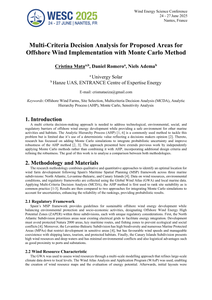This paper presents the design of the offshore energy simulation CEL as a flow network, and its integration in the MSP Challenge 2050 simulation game platform. This platform is designed to aid learning about the key characteristics and complexity of marine or maritime spatial planning (MSP). The addition of CEL to this platform greatly AIDS MSP authorities in learning about and planning for offshore energy production, a highly topical and big development in human activities at sea. Rather than a standard flow network, CEL incorporates three additions to accommodate for the specificities of energy grids: an additional node for each team's expected energy, a split of each node representing an object into input and output parts to include the node's capacity, and bidirectional edges for all cables to enable more complex energy grid designs. Implemented with Dinic's algorithm it takes less than 30ms for the simulation to run for the average amount of grids included in an MSP Challenge 2050 game session. In this manner CEL enables MSP authorities and their energy stakeholders to use MSP Challenge 2050 for designing and testing more comprehensive offshore energy grids.
DOCUMENT

Within the context of the Iliad project, the authors present technical challenges and the first results of having valid 3D scenes of (non-)existing offshore wind farms procedurally and automatically generated within either the Unreal or Unity game engine. The Iliad – Digital Twins of the Ocean project (EU Horizon 2020) aims to develop a ‘system of systems’ for creating cutting-edge digital twins of specific sea and ocean areas for diverse purposes related to their sustainable use and protection. One of the Iliad pilots addresses the topic of offshore floating wind farm construction or maintenance scenario testing and validation using the Unity 3D game engine. This work will speed up the development of these scenarios by procedurally and automatically creating the Unity 3D scene rather than manually (which is done at present). The main technical challenges concern the data-driven approach, in which a JSON configuration file drives the scene creation. The first results show a base wind farm running in Unreal 5.1. The final product will be able to handle environmental conditions, biological conditions, and specific human activities as input parameters.
DOCUMENT

In this report, the details of an investigation into the e ect of the low induction wind turbines on the Levelised Cost of Electricity (LCoE) in a 1GW o shore wind farm is outlined. The 10 MW INNWIND.EU conventional wind turbine and its low induction variant, the 10 MW AVATAR wind turbine, are considered in a variety of 10x10 layout configurations. The Annual Energy Production (AEP) and cost of electrical infrastructure were determined using two in-house ECN software tools, namely FarmFlow and EEFarm II. Combining this information with a generalised cost model, the LCoE from these layouts were determined. The optimum LCoE for the AVATAR wind farm was determined to be 92.15 e/MWh while for the INNWIND.EU wind farm it was 93.85 e/MWh. Although the low induction wind farm o ered a marginally lower LCoE, it should not be considered as definitive due to simple nature of the cost model used. The results do indicate that the AVATAR wind farms require less space to achieve this similar cost performace, with a higher optimal wind farm power density (WFPD) of 3.7 MW/km2 compared to 3 MW/km2 for the INNWIND.EU based wind farm.
DOCUMENT

Small and medium-sized enterprises have found their way into multi-cultural relations to outsource or offshore their business processes. Relationships are built either from an economic or emotional point of view. Our study particularly focused on how SMEs owner/managers build, maintain, and –when necessary– exit their relationships with other SMEs by using trust as a core element. We have chosen for a qualitative research strategy by conducting semi-structured interviews in The Netherlands, Germany, UK, Denmark and Sweden. The countries selected are representatives of the application of Northern-European and Anglo-Saxon business models. Our results suggest that trust is of the essence in the relationship building process and that the perception of trust needs to be understood and managed in multi-cultural relations by all parties involved. We can also conclude from our results that SMEs are intrinsically inclined to base their offshore activities on trust. For practical reasons, partners in relationships need to be educated and trained how to build trust in multi-cultural relations. Future research should focus on the firms’ culture to examine the influence on trustful multi-culture relationships.
DOCUMENT
SMEs in South‐Holland: Digitally Mature? • High‐tech products (AgTech, (Aero)Space, Maritime‐Offshore, MedTech, Composites, Mechatronics • SMEs slow to digitalize • Industry 4.0 Toolkit helps?
DOCUMENT

DOCUMENT
DOCUMENT

Abstract: The key challenge of managing Floating Production Storage and Offloading assets (FPSOs) for offshore hydrocarbon production lies in maximizing the economic value and productivity, while minimizing the Total Cost of Ownership and operational risk. This is a comprehensive task, considering the increasing demands of performance contracting, (down)time reduction, safety and sustainability while coping with high levels of phenomenological complexity and relatively low product maturity due to the limited amount of units deployed in varying operating conditions. Presently, design, construction and operational practices are largely influenced by high-cycle fatigue as a primary degradation parameter. Empirical (inspection) practices are deployed as the key instrument to identify and mitigate system anomalies and unanticipated defects, inherently a reactive measure. This paper describes a paradigm-shift from predominant singular methods into a more holistic and pro-active system approach to safeguard structural longevity. This is done through a short review of several synergetic Joint Industry Projects (JIP’s) from different angles of incidence on enhanced design and operations through coherent a-priori fatigue prediction and posteriori anomaly detection and -monitoring.
DOCUMENT
